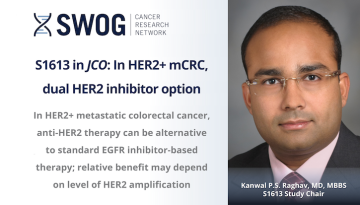More SWOG at ASCO
SWOG has an astonishing quantity of riches, in terms of results presented at the ASCO annual meeting this year. Last week I made a first pass at summarizing some important findings. This week I open with two oral abstracts that had late embargo dates, then dig into a number of additional results that should (will) have significant impact.
A positive Lung-MAP sub-study
The Lung-MAP S1800A sub-study tested the combination of ramucirumab plus pembrolizumab against usual care in patients with advanced non-small cell lung cancer (NSCLC) that had progressed on prior immunotherapy. The S1800A team found that patients treated with this combination lived significantly longer than patients treated with current standard therapies for this type of cancer. In fact, the combination reduced the risk of death by 31 percent compared to standard of care.
Dr. Karen Reckamp of Cedars-Sinai Medical Center in Los Angeles delivered these important results as an oral presentation at ASCO last week, and they were simultaneously published in the Journal of Clinical Oncology.
This is the first trial to show a survival benefit for these patients from treatment combining an immune checkpoint inhibitor with a VEGFR-2 inhibitor. As Dr. Reckamp notes, as S1800A was a phase II study, a full phase III trial is likely needed.
Hope for preventing kidney cancer recurrence
The S0931 EVEREST trial randomized more than 1,500 patients with high-risk renal cell carcinoma to a year of adjuvant everolimus or a placebo. Trial results showed a tendency for patients on the everolimus arm to have longer recurrence-free survival (RFS), although the results narrowly missed the trial’s prespecified significance level (with a P value of 0.025 falling just shy of the target of 0.022). Dr. Christopher W. Ryan of the Oregon Health & Science University presented these results as a late-breaking abstract at ASCO.
S0931 patients with very high-risk disease – versus intermediate high-risk disease – seemed to benefit most, with a 21 percent improvement in RFS. Of note is that the RFS benefit was seen despite a high rate of treatment discontinuation on the everolimus arm. Slightly less than one-half of those patients completed a full year of treatment, although as Dr. Ryan points out, high discontinuation rates are common with oral adjuvant therapies.
I also want to briefly highlight a few other presentations, starting with further findings from Lung-MAP:
- SWOG statisticians analyzed data on more than 3,500 patients enrolled to Lung-MAP to assess their representativeness compared to patients on other NSCLC trials and to US patients with NSCLC overall. Compared to other NSCLC trials, Lung-MAP improved access for older patients, rural patients, those with Medicaid or no insurance, and patients from socioeconomically deprived areas, although the Lung-MAP population was younger and less diverse than the overall US population of patients with NSCLC. [Abstract 6543]
- Circulating bone biomarkers are known to be strongly prognostic for overall survival in men with castration-resistant prostate cancer. A SWOG team prospectively evaluated these biomarkers in men with hormone-sensitive prostate cancer on the S1216 trial and presented evidence at ASCO that these indicators are prognostic in these patients as well, finding elevated levels were strongly associated with worse overall survival. [Abstract 5071]
- Researchers from SWOG and the Children’s Oncology Group collaborated to survey more than 1,500 members of the two cooperative groups to assess the impact of social media use on emotional health and burnout. Among social media users, 54 percent reported burnout, while 66 percent of non-users reported it. The researchers conclude that social media engagement may have a positive impact on wellness and help reduce burnout among oncology professionals. [Abstract 11013]
- Several methods are used to assess chemotherapy-induced peripheral neuropathy (CIPN) – some patient-based, some clinician-based – and no consensus exists on the best evaluation approach. SWOG S1714 enrolled more than 1,300 patients with a variety of cancers who were starting treatment with a taxane. Researchers assessed CIPN in these patients using both patient-based and clinician-based methods. They conclude that clinician assessments of neuropathy may underestimate patients’ symptoms, reinforcing the importance of using patient-reported outcomes in evaluating CIPN. [Abstract 12024]
We still have too many important results to cover here! I urge you to visit our table of SWOG-related ASCO 2022 abstracts and click through to explore the results.
One last note: If you haven’t yet registered for our Best of SWOG at ASCO webinar – scheduled for June 29, 2 pm ET/11 am PT – I encourage you to do so and get it on your calendar.
Other Recent Stories



